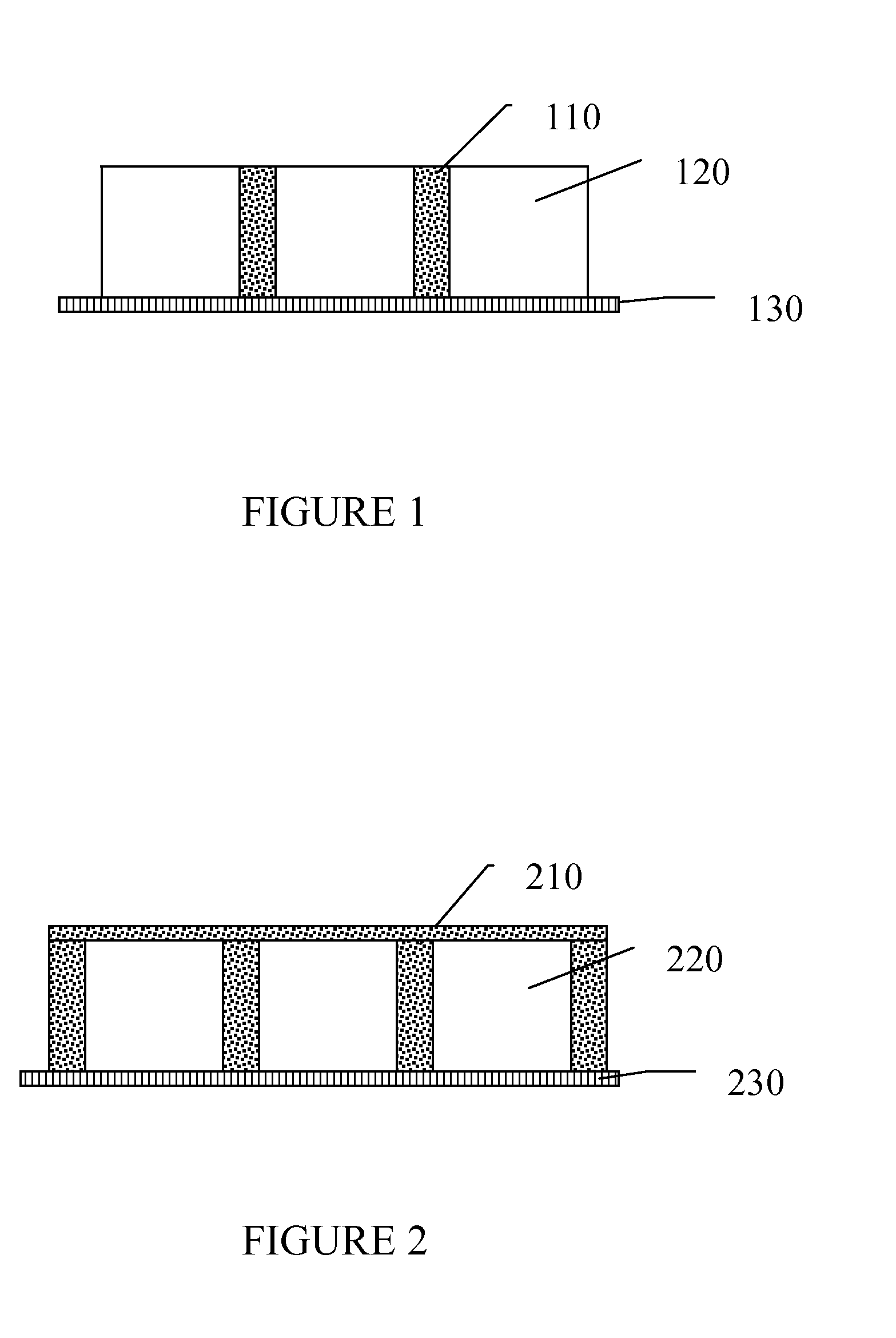Protective wound dressing device for oral and pharyngeal space
a protective wound and pharyngeal technology, applied in the field of medical and surgical wound dressings, can solve the problems of patients experiencing dehydration, pain and postoperative bleeding still significant, and pain and postoperative bleeding
- Summary
- Abstract
- Description
- Claims
- Application Information
AI Technical Summary
Benefits of technology
Problems solved by technology
Method used
Image
Examples
example 1
Preparation of a Water-Soluble Molding Matrix with an Open Cell Configuration
[0063]28.35 grams of unflavored Knox® gelatin (Kraft Foods, Inc.) was added to a beaker containing 236.6 mL purified cold water. Approximately ten drops of green food coloring were added to the mixture to tint the resulting water-soluble molding matrix. The beaker was placed on a stir plate and heated to approximately 60° C. and the contents were stirred at a medium speed of agitation for approximately thirty minutes until all gelatin was in solution. While still at the elevated temperature, the solution was poured in a flexible silicone mold with dimensions of 100 mm by 100 mm with a cell of 10 mm by 10 mm and a cell depth of approximately 10 mm. The solution was poured into the flexible mold such that the solution filled the cell only and did not cover the entire mold surface. The silicone mold containing the solution was placed into a refrigerator for 24 hours. The resulting water-soluble molding matrix ...
example 2
Preparation of a Water-Soluble Molding Matrix with a Film-Spanned Configuration
[0064]6 grams of polyvinyl alcohol powder (molecular weight approximately 20,000 Daltons, MP Biomedicals, LLC) was added to a beaker containing 60 mL of a 50 / 50 by volume mixture of isopropyl alcohol and purified water. Approximately five to six drops of red food coloring were added to the mixture to tint the resulting water-soluble molding matrix. The beaker was placed on a stir plate and heated to approximately 80° C. and the contents were stirred at a medium speed of agitation for approximately thirty minutes until all powder was in solution. While still at the elevated temperature, the solution was poured in a flexible silicone mold with dimensions of 150 mm by 150 mm with a cell of 5 mm by 5 mm and a cell depth of approximately 3 mm. The solution was poured into the flexible mold such that the solution filled the cell as well as a thin film layer over the entire cell area. The silicone mold containin...
example 3
Durability Evaluation of Wound Dressing Utilizing Example 1 Water-Soluble Molding Matrix
[0065]A bench method was developed to evaluate samples produced according to the present invention. The test fixture was kept at approximately 37° C. to approximate body temperature. Samples were kept moist using saline to simulate saliva or other bodily fluids. Samples were subjected to an abrasive force generated by a roller to simulate swallowing. The average adult swallows 1000 times a day (Gleeson, D C. Oropharyngeal swallowing and aging: A review. J. Commun. Disord. 1999:32; 373-396). As a result, 500 cycles of the test apparatus (one back and forth motion) represents approximately one day. Since this abrasive force was much more aggressive than swallowing, these test results were considered a “worst case scenario”.
[0066]A foam pad (McMaster-Carr) was placed onto the bed of an Elcometer 1720 Abrasion Tester to support the test sample. A piece of collagen (250 mm by 150 mm by ˜5 mils, Vista ...
PUM
 Login to View More
Login to View More Abstract
Description
Claims
Application Information
 Login to View More
Login to View More - R&D
- Intellectual Property
- Life Sciences
- Materials
- Tech Scout
- Unparalleled Data Quality
- Higher Quality Content
- 60% Fewer Hallucinations
Browse by: Latest US Patents, China's latest patents, Technical Efficacy Thesaurus, Application Domain, Technology Topic, Popular Technical Reports.
© 2025 PatSnap. All rights reserved.Legal|Privacy policy|Modern Slavery Act Transparency Statement|Sitemap|About US| Contact US: help@patsnap.com

